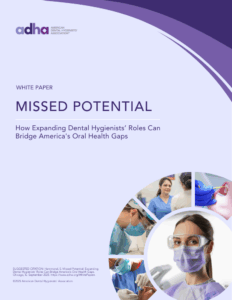FOR IMMEDIATE RELEASE
ADHA Calls for Dental Hygienist Practice Expansion and Autonomy to Address Access Crisis
White paper documents devastating oral health gaps and provides roadmap for policy reform

The new white paper is available for download at adha.org/whitepapers.
CHICAGO, Sept. 10, 2025 – The American Dental Hygienists’ Association (ADHA) today released “Missed Potential: How Expanding Dental Hygienists’ Roles Can Bridge America’s Oral Health Gaps,” a white paper exposing systemic barriers to oral healthcare and demonstrating how expanded dental hygienist autonomy can improve access to preventive care.
The research reveals that 40% of Americans who plan to receive dental care never actually receive it due to access barriers. The white paper shows 24.7 million Americans live in dental care shortage areas, 1.7 million cannot access care within a 30-minute drive, and periodontal disease costs $154.06 billion annually in lost productivity.
“This white paper is another example of our profession offering evidence-based support for critical policy changes and development,” said Lancette VanGuilder, ADHA president. “Through ADHA’s strong advocacy work and growing federal presence, we’re making dental hygienists’ voices heard as vital healthcare providers and demonstrating that our profession is essential to solving America’s oral health crisis. Removing outdated practice barriers isn’t just good policy—it’s critical to healthcare infrastructure.”
The research compares states with different dental hygienist practice laws. Colorado, which allows full autonomy, reports only 10% of low-income adults describe their oral health as poor, compared to 27% in Mississippi, which restricts dental hygienist practice.
“The evidence shows that expanded dental hygienist autonomy dramatically improves access to preventive care, especially for underserved populations,” said Dr. JoAnn Gurenlian, ADHA’s director of education, research and advocacy. “This research provides policymakers with data showing that empowering hygienists to provide the preventive care they were educated to perform prevents costly emergency interventions and improves population health outcomes—it’s a public health imperative.”
The white paper calls for four policy changes: allowing dental hygienists to practice to the highest national level, removing practice setting restrictions, supporting mobile, portable and tele-dentistry utilization, and providing direct reimbursement for dental hygienist services.
The white paper was authored by Shelley Hammond, MMC and is available for download at adha.org/whitepapers.
###
About the American Dental Hygienists’ Association
The American Dental Hygienists’ Association (ADHA) is the only organization representing the professional interests of the more than 220,000 dental hygienists in the United States. Dental hygienists are preventive oral health professionals, licensed in dental hygiene, who provide educational, clinical and therapeutic services that support total health through the promotion of optimal oral health. The Journal of Dental Hygiene (JDH), published bi-monthly, is ADHA’s scientific journal and flagship publication. To learn more about the ADHA, dental hygiene or the link between oral health and general health, visit www.adha.org.
ADHA Media Contact
Bronwyn Barrera
(312) 440-8911
[email protected]
